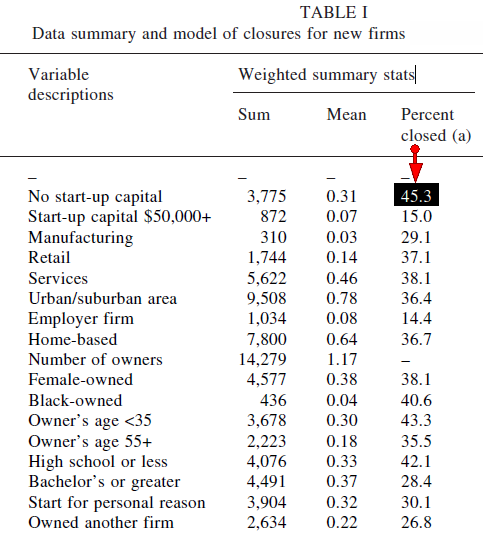I just read an interesting study about business failures commissioned by the U.S. Small Business Administration.
The study aimed to see why businesses fail, and to understand the difference between businesses that fail versus businesses that close for other reasons.
And, as the chart below indicates, the number one reason why businesses fail is lack of funding. In fact, nearly half of the businesses that failed attributed lack of funding to their downfall.

Another factor that significantly influenced failure rates was the age of the entrepreneur. The study indicated that entrepreneurs below the age of 35 are more likely to fail than older entrepreneurs.
I’ve always considered age to be an interesting factor in regards to entrepreneurial success. Here’s my thinking:
Oftentimes younger entrepreneurs have an advantage in terms of time, energy and freedom. With regards to time, they often don’t have families and thus can work later and on weekends. And they might have a little more energy, or be a little “hungrier,” since they haven’t achieved as much business success as older entrepreneurs. And finally, because they may not have mortgages and other financial obligations and assets, they may have a little more freedom to take risks than older entrepreneurs.
Older entrepreneurs, on the other hand, are probably more successful due to experience and expertise. Older entrepreneurs generally have more maturity and experience, allowing them to make more informed decisions and to learn from past mistakes. They typically also have more domain expertise (i.e., a deep knowledge of their market from working in it for so long).
Fortunately for young entrepreneurs, there is a great solution to their lack of experience, which is to get Advisors and/or build an Advisory Board. (Note that I define Advisors as successful people that you respect and that agree to help your company. Advisors are generally successful and/or retired executives, business owners, service providers, professors, or others that could help your business. An Advisory Board is simply a group of Advisors.)
In fact, I often site the following four reasons why ALL entrepreneurs (young and old) should have Advisors:
1. Practice: if you can’t successfully pitch an advisor to invest time in your business, then you are not going to successfully pitch anyone to invest money in your business. So, practice your pitch on prospective advisors first, and use that practice to perfect it.
2. Connections to capital: as successful individuals, advisors often have the ability to invest directly in your company; and/or they tend to have large, high quality networks of individuals that they can introduce you to.
3. Credibility: having quality advisors gives your company instant credibility in the eyes of lenders and investors. For example, if you started a new hockey stick company, having Wayne Gretzky as an advisor would certainly give you great credibility (and connections).
4. Operational success: mentors and advisors are an entrepreneur’s “single most controllable success factor” according to Dr. Basil Peters, a successful entrepreneur, angel investor, venture capitalist. Having Advisors with whom you can discuss key business matters as you grow your venture will help ensure you make the right decisions, particularly if they have encountered and dealt with the same challenges already in their careers.
So, while the #1 predictor of startup success may be funding, you may want to focus first on getting Advisors. Since this will help not only with getting funding, but with giving your organization an experienced sounding board to make high quality decisions.


